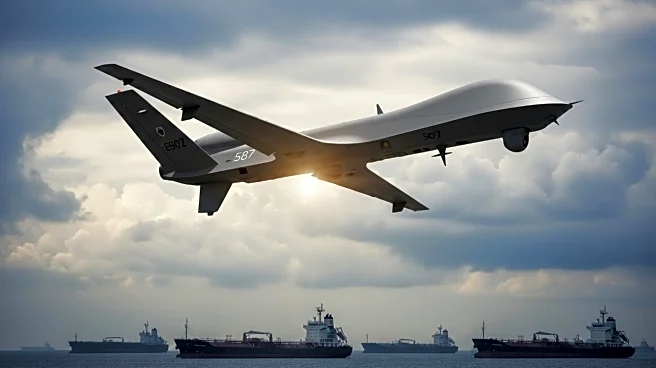What's Happening?
Ukrainian President Volodymyr Zelenskyy has accused Russia of utilizing oil tankers to launch drones targeting European nations, highlighting a pattern of airspace violations across NATO countries. These incidents have involved Russian drones and military aircraft breaching the airspace of multiple nations, including Poland, Romania, Estonia, Denmark, Norway, Germany, Sweden, Lithuania, and Finland throughout September. The most severe incident occurred in Denmark, where drones forced the closure of Copenhagen's main airport for four hours, marking a significant attack on critical infrastructure. The shadow fleet of oil tankers, created by Russia to circumvent international sanctions, is believed to be instrumental in these operations.
Why It's Important?
The escalation of Russian drone and aircraft intrusions into NATO airspace poses significant security challenges for European nations and the alliance as a whole. These actions not only threaten critical infrastructure but also test the readiness and response capabilities of NATO members. The use of oil tankers to facilitate these operations underscores the complexity of enforcing sanctions and the need for enhanced maritime security measures. The incidents could lead to increased military and diplomatic tensions between Russia and NATO countries, potentially impacting regional stability and international relations.
What's Next?
In response to these violations, Germany has announced the creation of a new Drone Defense Center, indicating a proactive approach to countering such threats. Other NATO countries may follow suit, enhancing their airspace monitoring and defense capabilities. Diplomatic efforts to address these violations are likely to intensify, with potential discussions on further sanctions or maritime restrictions against Russian tankers. The situation may also prompt NATO to reassess its defense strategies and cooperation mechanisms to better protect member states from aerial threats.
Beyond the Headlines
The use of oil tankers for military operations raises ethical and legal questions regarding the enforcement of international sanctions and maritime law. It highlights the challenges in tracking and regulating the activities of the shadow fleet, which operates outside traditional oversight mechanisms. This development may lead to calls for stricter international regulations and cooperation to prevent the misuse of commercial vessels for military purposes, ensuring the integrity of global trade and security.









